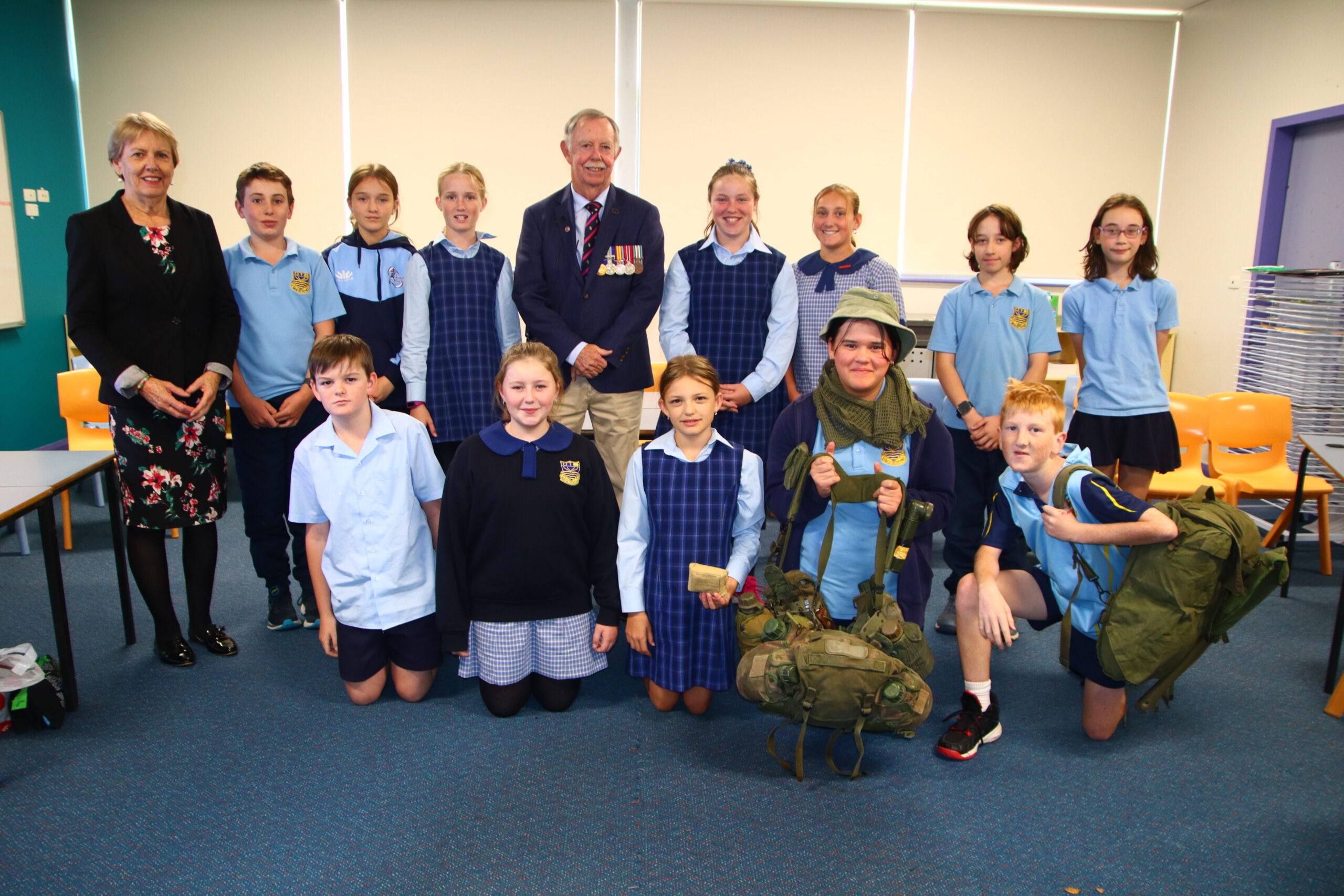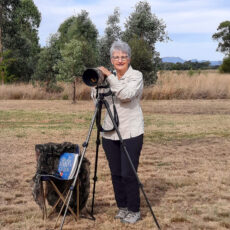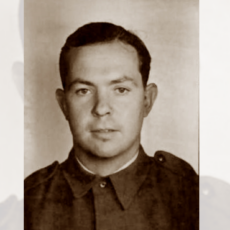Narrabri Public School students are commemorating the 50th anniversary of the Vietnam War with a special entry into the Anzac Day 2023 competition, enlisting the help of Vietnam veteran and historian Richard Barry OAM.
The year 5 and 6 enrichment class will mark the occasion by submitting their piece of Narrabri history: a presentation including a video interview asking Mr Barry about his Vietnam War experiences, a class poem, and speeches.
“This has been a huge learning journey for our students and has made them very aware that we are living our best lives in this country because of the sacrifice that has gone before us,” said enrichment class teacher, Lindy White.
“This interview allowed our students to learn firsthand the facts relating to this conflict and the emotions of our nation at the time and for the years that followed.
“The other aspiring attribute resulting from this project is that a whole new generation of students will realise that Anzac Day and Remembrance Day is not just about the Anzacs and Gallipoli, but the Anzac spirit continued as a part of the Vietnam War.”
Hosted by the Department of Veterans’ Affairs, the Anzac Day Schools’ Awards is a national competition recognising the work of students, teachers, and schools who engage with veterans and honour Australia’s wartime history.
Mr Barry, who was part of 10th Intake National Service, was a Forward Scout with the 6th Battalion Royal Australian Regiment and completed almost six months combat duty in South Vietnam before being send back to Australia.
He offered a unique perspective as an infantry soldier who was called up via the mandatory conscription ballot, first introduced to bolster army strength for the Vietnam War.
Failure to register could incur two-year imprisonment and a criminal record.
“I had never won anything in my life before until I won that raffle and had to go to the war,” Mr Barry said to the class.
Mrs White emphasised the impact on soldiers who were enlisted via conscription and advised the class to be respectful and mindful that out of all the soldiers who went to war, more than 500 did not return home and over 3000 were seriously wounded.
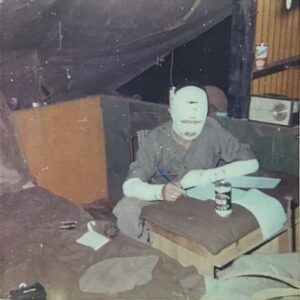
Richard Barry OAM in his tent at Nui Dat South Vietnam writing to his father in Narrabri in July 1969 following an aviation fuel explosion.
“Our students learned first-hand how this system worked and the consequences that followed for the men because of conscription,” said Mrs White.
Mr Barry was also invited to give the Anzac address at Narrabri Public School, and his moving speech dedicated to the nurses of the war will also be featured in the presentation.
For the interview portion, Year 6 students presented insightful questions to ask Mr Barry about his experience in the war which was recorded in a video presentation.
The questions were framed around why the war started, Mr Barry’s involvement, and how he felt during and after his service had ended.
When Noah Burford asked: Did going to a war affect you, Mr Barry? He answered, “That is a great question, and sometimes one that is not asked.
“I still have flashbacks of the war all the time.
“I was brought up being taught to respect all life, but when I went to war, I was taught to kill.
“We were even labelled as baby killers by the media which was very upsetting.
“We were not welcomed home like our fathers and grandfathers from previous wars.
“The soldiers became your family and when you fought alongside someone you then created a mateship.
“You fought, ate, slept together, shared the same trauma, the sheer exhaustion, you are scared constantly, we were stuck there so we couldn’t run away or leave, many men died from fatigue and exhaustion.
“We had a lot of humour and pride, always had a little joke to keep everyone on the right track.
“But there was danger around every corner and every day I woke up, I felt that this could be my last.
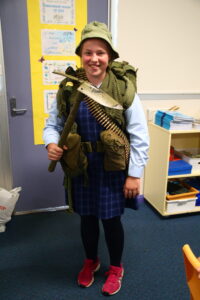
Narrabri Public School Year 6 student Elsie Barton demonstrating Richard Barry’s Vietnam infantry soldier webbing for the class.
Mr Barry didn’t hold back in his honest recollections, and the students never blinked, as he divulged the details of the physical and mental battles that a soldier of war endured.
For the Q&A interview session, Mr Barry also brought along and dressed a student in his original Vietnam War webbing to the absolute delight of the students.
“The students got to see what an old infantry soldier wore in Vietnam, so they could understand all the backpacks, tools, 200 rounds of machine ammunition, and magazines that soldiers would have to carry while out on the field.
“It was encouraging to see the students so interested and engaged through the whole talk.”
Student Ashlyn Saunders asked: How are you doing today, after the war?
Mr Barry said, “It’s 54-years ago that I came home, and time does heal.
“Twenty years after the war they had a welcome home parade in Sydney, and as we all marched in the street in Sydney, people had tears in their eyes.
“I was pushing a veteran in a wheelchair who had both his legs blown off by an anti-personnel mine. He asked me with tears streaming down his face, do we deserve this,” and I said “Yes, we’ve finally been welcomed home, we’ve finally been recognised.
At the end of the interview, Mrs White addressed the class once again and said, “It’s amazing to sit here and listen to Mr Barry tell us what they went through. We learned about bravery and true grit, determination, and selflessness.
“These soldiers displayed both personal and collective courage and they did it because their country asked.
“These kinds of people are why we commemorate Anzac day.
“Now we can stand up at Anzac and say we met a true veteran.”
To order photos from this page click here